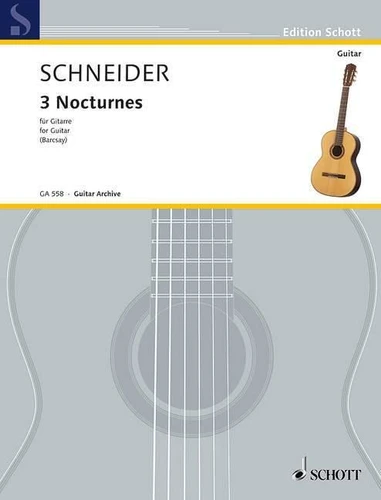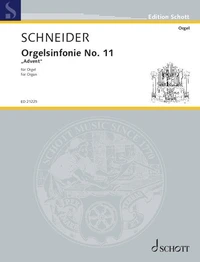Edition Schott
3 Nocturnes. guitar.
Par : Formats :
- Paiement en ligne :
- Livraison à domicile ou en point Mondial Relay indisponible
- Retrait Click and Collect en magasin gratuit
- Réservation en ligne avec paiement en magasin :
- Indisponible pour réserver et payer en magasin
- Nombre de pages16
- Poids0.085 kg
- Dimensions23,1 cm × 30,3 cm × 0,0 cm
- ISBN979-0-001-17965-2
- EAN9790001179652
- Date de parution01/01/2012
- CollectionGuitar Archive
- ÉditeurSchott
- EditeurStefan Barcsay
Résumé
Nocturnes have a long tradition - from the notturni by Mozart and Haydn via the nocturnes of the Romantic era to Chopin who elevated the genre to fascinating character piece : He created ambivalently shining gems in an unreal world of human nature which were as close to the extremely sublime as to a demonic abyss. Enjott Schneider's '3 Nocturnes', the core of each of which is characterized by a Latin motto, stand in this tradition.
Cicero's 'Somnus est imago mortus' sees sleep as a resemblance of death. 'Die Zeit eilt weg, die Liebe aber bleibt' [Time passes but love remains] explores the ambivalence between that what is hurrying and that what stays eternally. Ovid's 'Der Tropfen höhlt den Stein nicht durch Kraft, sondern durch stetes Fallen' [The drop hollows the stone, not by force but by constant dripping] has its counterpart in a minimalist motif which has a lasting influence on the listener through its constant sounding.
Instrumentation : guitar
Cicero's 'Somnus est imago mortus' sees sleep as a resemblance of death. 'Die Zeit eilt weg, die Liebe aber bleibt' [Time passes but love remains] explores the ambivalence between that what is hurrying and that what stays eternally. Ovid's 'Der Tropfen höhlt den Stein nicht durch Kraft, sondern durch stetes Fallen' [The drop hollows the stone, not by force but by constant dripping] has its counterpart in a minimalist motif which has a lasting influence on the listener through its constant sounding.
Instrumentation : guitar
Nocturnes have a long tradition - from the notturni by Mozart and Haydn via the nocturnes of the Romantic era to Chopin who elevated the genre to fascinating character piece : He created ambivalently shining gems in an unreal world of human nature which were as close to the extremely sublime as to a demonic abyss. Enjott Schneider's '3 Nocturnes', the core of each of which is characterized by a Latin motto, stand in this tradition.
Cicero's 'Somnus est imago mortus' sees sleep as a resemblance of death. 'Die Zeit eilt weg, die Liebe aber bleibt' [Time passes but love remains] explores the ambivalence between that what is hurrying and that what stays eternally. Ovid's 'Der Tropfen höhlt den Stein nicht durch Kraft, sondern durch stetes Fallen' [The drop hollows the stone, not by force but by constant dripping] has its counterpart in a minimalist motif which has a lasting influence on the listener through its constant sounding.
Instrumentation : guitar
Cicero's 'Somnus est imago mortus' sees sleep as a resemblance of death. 'Die Zeit eilt weg, die Liebe aber bleibt' [Time passes but love remains] explores the ambivalence between that what is hurrying and that what stays eternally. Ovid's 'Der Tropfen höhlt den Stein nicht durch Kraft, sondern durch stetes Fallen' [The drop hollows the stone, not by force but by constant dripping] has its counterpart in a minimalist motif which has a lasting influence on the listener through its constant sounding.
Instrumentation : guitar




















